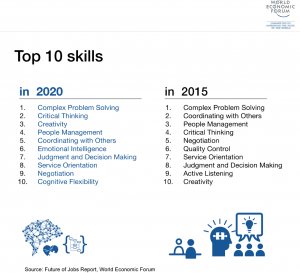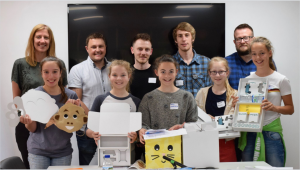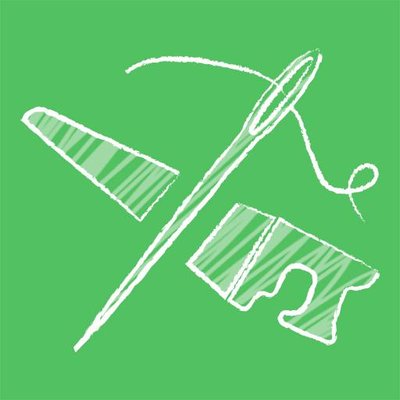Marcia Phillip, Head of Design and Technology, discusses some of the projects relating to changes to the D&T curriculum.
“We stand on the brink of a technological revolution that will fundamentally alter the way we live, work, and relate to one another. In its scale, scope, and complexity, the transformation will be unlike anything humankind has experienced before. We do not yet know just how it will unfold, but one thing is clear: the response to it must be integrated and comprehensive, involving all stakeholders of the global polity, from the public and private sectors to academia and civil society.”
14 Jan 2016 Klaus Schwab Founder and Executive Chairman, World Economic Forum Geneva
A new approach in delivering a 21st Century D&T Curriculum
 The aim at WHS is to equip students with the new skill set that they will require for the predicted ‘Fourth Industrial revolution 2020’ and to meet the shortage in UK Engineers, especially with women. We needed to change the approach to how Design and Technology is taught in response to a changing world.
The aim at WHS is to equip students with the new skill set that they will require for the predicted ‘Fourth Industrial revolution 2020’ and to meet the shortage in UK Engineers, especially with women. We needed to change the approach to how Design and Technology is taught in response to a changing world.
As part of my research I came across a project called ‘Designing Our Tomorrow’ (DOT) which was being developed by the University of Cambridge and linked perfectly to where I wanted to take D&T. I made contact and the initial results have already had a significant impact on the students’ learning and experience in Year 7 with WHS now playing a major part of the University’s research. We introduced these projects to our sister schools on 26th June at the annual GDST D&T Conference held at WHS, in the hope that GDST will take the lead in changing how D&T is delivered in schools.
The ‘DOT’ Box ‘Unpacking Asthma’ is the first project trialled at WHS. The Institute of Materials, Minerals and Mining ran the competition on behalf of the University of Cambridge via their Schools StarPack Awards, where our Year 7 students walked away with the top prizes, despite the project being aimed at Year 9 and Year 10 students. We had a range of textiles and card outcomes which were innovation and responded well to the brief.
About DOT
Designing Our Tomorrow is an initiative from the University of Cambridge that brings together expertise from the Faculty of Education and the Department of Engineering in order to research and develop resources for teaching STEM and secondary level D&T as part of the mainstream curriculum. It puts authentic challenges and engineering practice at the heart of the learning experience.
Unpacking Asthma Project
Sponsored by Peter Brett Associates LLP, and developed by The University of Cambridge in conjunction with the NHS and Asthma UK. Peter Brett Associates LLP (PBA) are an award winning development and infrastructure consultancy consisting of 700 engineers, planners, scientists, and economists delivering major development and infrastructure projects.
The Brief
The DOT Challenge is a new award that focuses on solving a real world problem. This year’s challenge focuses on the problems with treating asthma with children who are under 6 years old. Solutions that best address this problem received the StarPack Award and their ideas were taken forward for implementation within the NHS, giving students the experience of seeing how ideas are developed and realised in Industry.
Working with Designers

On Thursday 8th June 2017, five of the WHS Award winners had an initial interview by Bill Nicholl, a Cambridge University researcher and Lecturer in Design and Technology Education who has been working on the research and public engagement so that the whole process could be tracked and accurately portrayed in their research paper. The girls were then giving an opportunity to work with international packaging design company D S Smith at their Derby branch on Tuesday 13th June 2017.
The students had an amazing day. There were 10 trainee teachers also present who were looking at how they could implement this in their teaching as well as a parent who has a child who suffers from asthma and wanted to share his traumatic experience and how a child friendly solutions could make a difference to many parents and young child.
The day started with introductions and our girls presenting their concepts to all who were present. They then worked 1 on 1 with a designer, discussing their ideas and further developing them based on the new constraints given by NHS. They all made several iterations before it was time to leave. The day ended with the girls presenting the improved concepts with their designer. However, this was not the end of the story only the beginning, all 12 girls who were entered were shortlisted and achieved an award which they received on 28th June at a special celebration ceremony held in London at the IOM3 offices. The five selected students had another day out on 30th June to present the ideas at the British Paediatric Respiratory Conference.
Presenting at the NHS British Paediatric Respiratory Conference
 This was another valuable opportunity where the girls stood and presented their concepts. They responded extremely well to the questions from various delegates who were very impressed with their ideas. After their presentation a number of delegates had further conversations about how the ideas developed and took closer looks at the latest iterations developed in conjunction with DS Smith. A number of delegates were keen to see it progress and one in particular, Sara Nelson RGN from Healthy London Partnership based at the Evelina Hospital at St Thomas, was very interested in running a pilot at her clinic with the textiles monkey bag design created by Sascha. A great day was had by all.
This was another valuable opportunity where the girls stood and presented their concepts. They responded extremely well to the questions from various delegates who were very impressed with their ideas. After their presentation a number of delegates had further conversations about how the ideas developed and took closer looks at the latest iterations developed in conjunction with DS Smith. A number of delegates were keen to see it progress and one in particular, Sara Nelson RGN from Healthy London Partnership based at the Evelina Hospital at St Thomas, was very interested in running a pilot at her clinic with the textiles monkey bag design created by Sascha. A great day was had by all.
Collaboration
Sascha was asked by Cambridge University to develop her design further over the summer holidays ready for 15th September HLP Asthma Campaign launch. She had adapting her design to made in card to make it more cost effective as the NHS as we know has a tight budget. Her ideas were then forwarded to DS Smith who work on the next iteration.
On the 15th September, our 5 students were asked to work once again with designers from DS Smith in a collaboration with some students from Grieg City academy, who had also entered the competition. This was a partnership of our 5 girls who, were now in Y8, and seven Y10 students from Greig City. The new challenge was to work alongside designers and educational experts to improve the winning monkey card mask design, generate concepts for the supplementary information to go with the mask, to launch the prototype idea and integrate with the Healthy London Partnership Asthma campaign. Students also had to consider making aspects such as the inhalers more inclusive by consider the issues associated with ageing, as one of the stakeholders in this brief was Grandma.
This was an amazing experiencing seeing our students taking leading roles, in the teams they were allocated to, and engaging with a real world context applying their problem solving skills which will make a real difference to young people’s lives. Working alongside industry and educational professionals allowed the girls to experience all aspects of a design process and broaden their horizons through the effects of their efforts in genuine practice.
Evelina Children’s Hospital visit
Sascha, with her winning design, was invited to present her concept to the NHS Lead for Paediatric Respiratory conditions, Richard Iles, and Sara Nelson, ‘Ask About Asthma’ Programme Lead at Evelina Children’s hospital, St Thomas, London on Wednesday 20th September. It was a very exciting opportunity where Sascha was able to discuss her idea with clinicians, had a photo shoot and presented it to a young patient to trial. We were able to see developments of the spacer by industrial companies which were more efficient and could work extremely well with Sascha’s design.
We await the results of the trial period and the next steps. The journey does not stop here for Sascha…
The future
The Asthma competition will run again this year, as Cambridge University and the NHS would like a number of possible solutions that would appeal to different children’s requirements who have asthma. We will be running it with our Year 9 students so watch this space…
The DOT team are in the process of developing other DOT boxes. I have hosted another training session with a project that focuses on Inclusive Design and our ageing population, in the hope that our ‘Designers of Tomorrow’ can empathise and develop commonly used products which cater for the majority of our population without special adaptions.
Follow the WHS DT department on Twitter.

